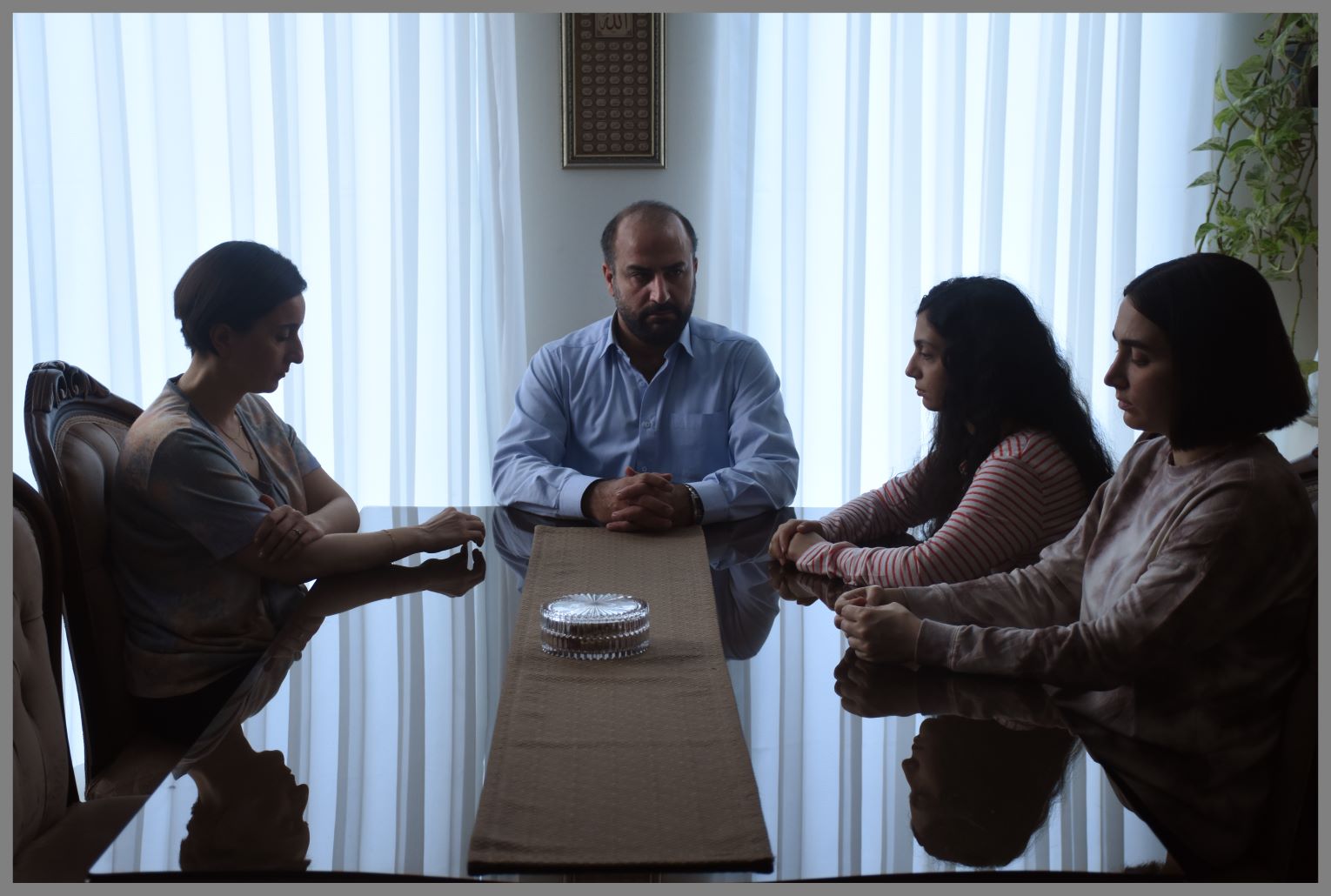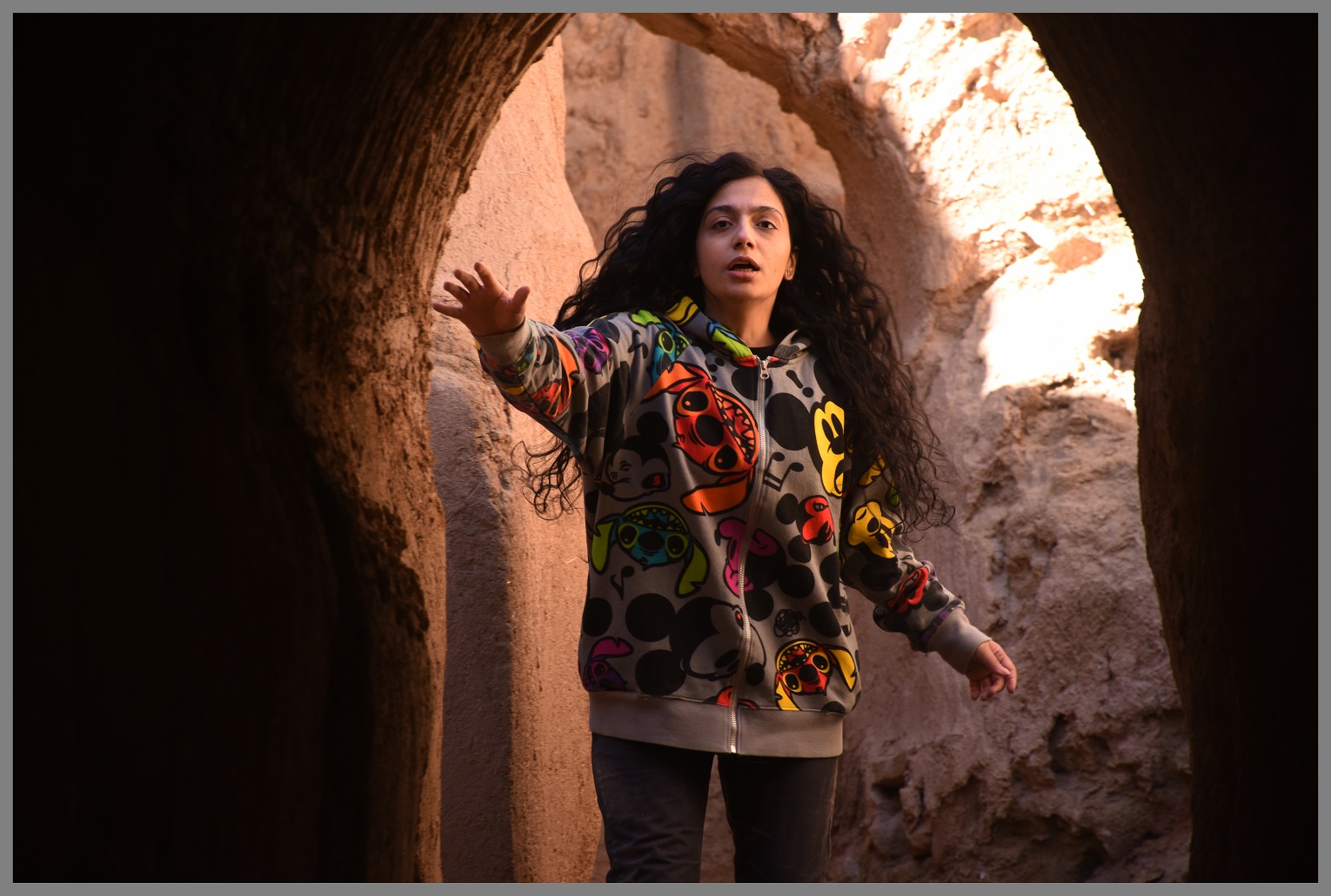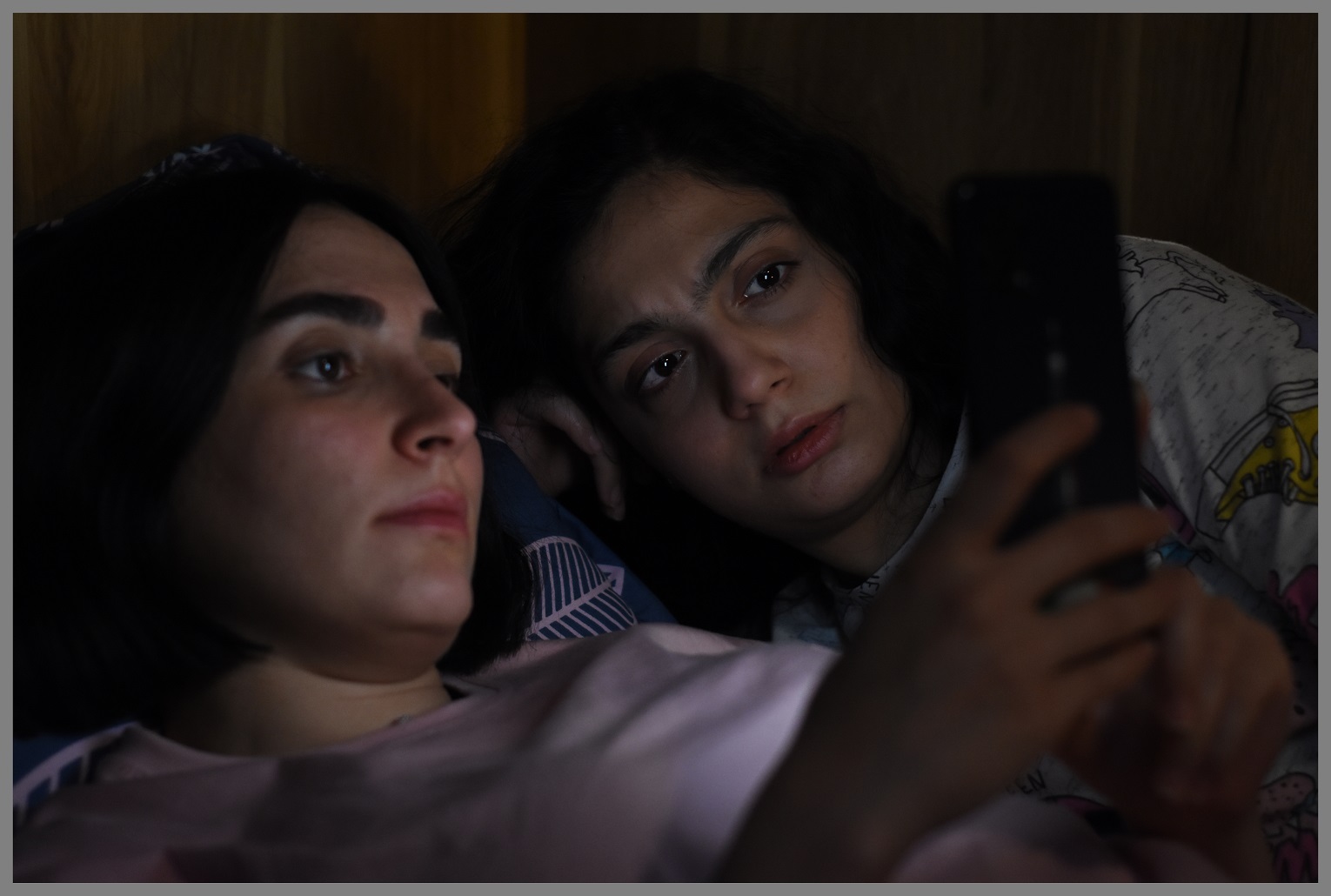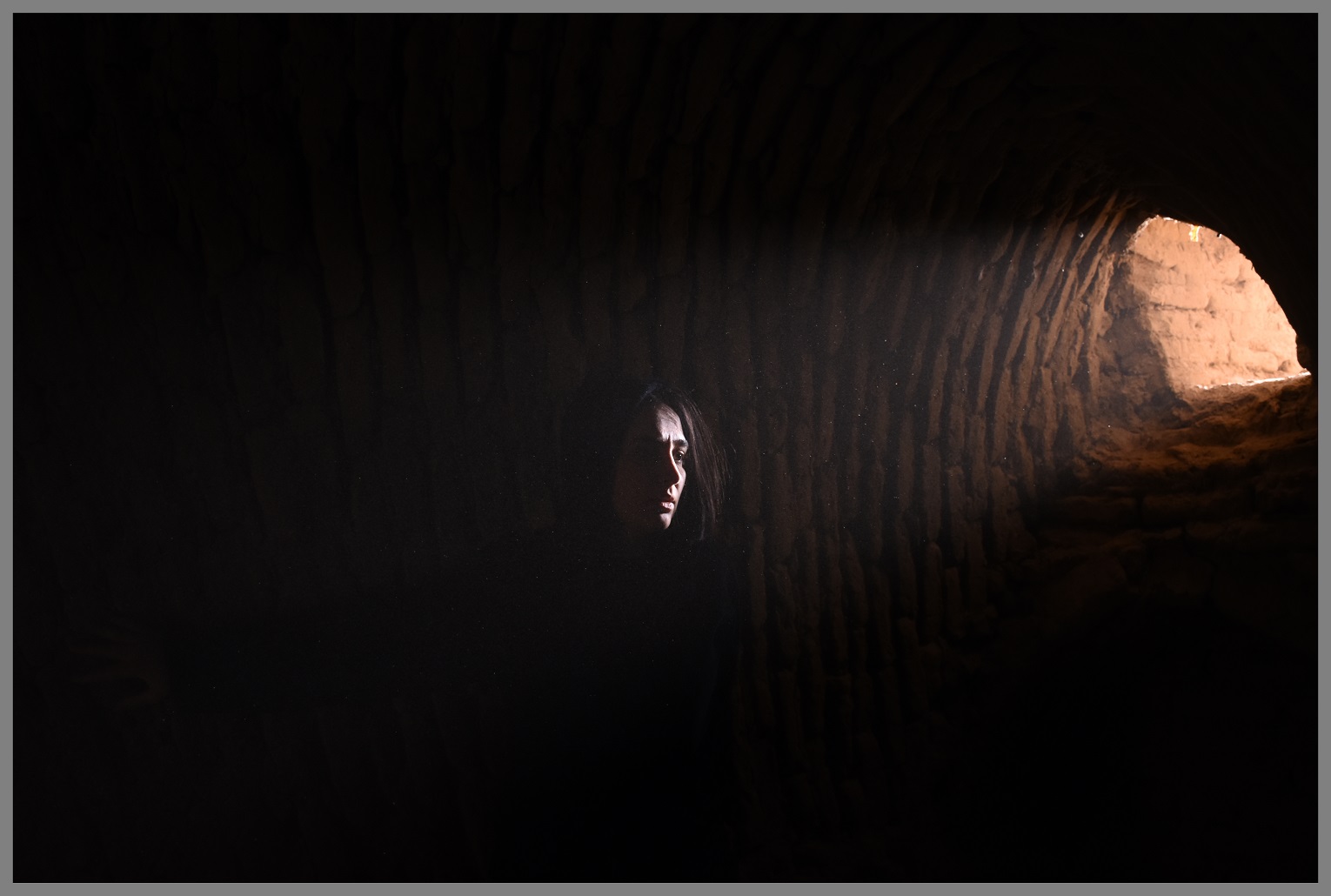theartsdesk Q&A: Iranian director Mohammad Rasoulof on 'The Seed of the Sacred Fig' - 'It became a question of self-respect' | reviews, news & interviews
theartsdesk Q&A: Iranian director Mohammad Rasoulof on 'The Seed of the Sacred Fig' - 'It became a question of self-respect'
theartsdesk Q&A: Iranian director Mohammad Rasoulof on 'The Seed of the Sacred Fig' - 'It became a question of self-respect'
The exiled filmmaker on authoritarian minds, reluctant radicalism and Iran's future
Iranian director Mohammad Rasoulof is now an Oscar-nominated refugee, in a bittersweet harvest for his film The Seed of the Sacred Fig.
The 52-year-old has previously probed the moral cost of his country’s dictatorship in Manuscripts Don’t Burn (2013), A Man of Integrity (2017) and There Is No Evil (2020), work where characters suffer and snap, or refuse to participate in repression at great cost. Routinely banned at home, work right up to Sacred Fig was shot in secret, brave guerilla cinema now necessarily common in Iran.
Faced with eight years’ jail, flogging and seizure of property for previous offences having only recently left prison, and with Sacred Fig’s themes sure to increase his sentence, Rasoulof was forced into an arduous, month-long trek to asylum in Germany, from where he speaks to theartsdesk.
The Seed of the Sacred Fig is a white-knuckle paranoia film of the sort once practised by Alan J Pakula and Costa-Gavras, but with its persecution mercilessly applied to a middle-class family. Iman (Missagh Zareh) is a newly promoted judge, just as the clampdown on 2022’s protests at the death of student Mahsa Amini in morality police custody and more general oppression provide piles of state executions to approve. “Work is work,” ambitious wife Najmeh (Soheila Golestani) soothes. Rezvan (Mahsa Rostami) and Sana (Setareh Malek, pictured below right with Golestani, Zareh and Malek) are more questioning but loving daughters, till Rezvan’s student friend seeks sanctuary in their flat, where Najmeh reluctantly picks police buckshot from her half-blinded face.
The domestic setting gives this thriller terrifying, cumulative intimacy. The horrified teenagers hear protests and gunshots in the street and see it on social media in their shared bedroom’s dim light. When Iman loses an official pistol and decides his daughters are to blame, he brings official interrogation techniques home. It’s a sweaty parable of generational and gender rebellion which leaves the initially sympathetic Iman a self-pitying ogre, surrounded by “treacherous” women.
Silver-haired with a soft, scholarly voice, Rasoulof wears his filmography’s steely conviction lightly, displaying wry, rigorous intellect. In the following interview he takes a long view of Iranian history with roots in Persian antiquity, sure that he hasn’t seen the last of his beloved, benighted home.
MOHAMMAD RASOULOF: Writing Iman was very difficult because I was very keen to keep the film focused on ideology, and submission to power – there’s an Iranian phrase that literally means handing over your head for someone who will decide for you. You’re also dealing with religious power, which is always keen on giving simple answers, and when religious power also assumes political power it does weird things to the legitimacy it bestows on the individual. In all these years I had dealings with people who work for the system, judges, prosecutors, interrogators and so on, I always wondered how their minds work – how they can have a human aspect like anyone else, yet what’s happening up here? I really am convinced that their minds think differently. And what’s happening with Iman is that he’s caught and confused between two aspects of his religiosity – his personal faith, where ethics are important, and the political faith that he has to enforce, where power is more important than ethics. In the end, it’s his past that really influences him, where he grew up and how he was educated triumphs.
When the injured girl Sadaf is brought into the apartment, does that literally bring home the truth of what’s happening to Najmeh, so she can no longer believe in the TV version? And in a larger sense, is that what happened with the protests – that they were so big and unavoidable that propaganda ceased to work?
Yes, and moreover, Sadaf coming to the house forces Najmeh to come to terms with her humanity and her maternal instincts, although she decides to turn down that voice. At the same time this has a major impact on her younger daughter, Sana, who’s astounded and starts thinking that her father must have had some part in this, and so decides to take action.
If we think that this family is stuck on a ship at sea, when a storm breaks out, the storytelling is going to follow this sea-change. I decided to follow this principle in the narrative but also the way of filming, and most importantly to follow the emotional development of the character. I must confess I was really nervous about attempting this, and I thought it might not work out at all. But in the end I’m really glad it did.
Making the film was clearly an act of courage and defiance from everyone involved. Did those emotions change the film? Is that spirit in its fibre?
If you asked me right now in terms of the filmmaking, it had more of a negative impact, in that it restricted the things I wanted to do. It may have other positive aspects that I’m not aware of yet. Basically what happens is that all you really want to do is make a film, but you unavoidably get drawn into an act of resistance. You become an activist, making a revolutionary act.
It’s possible to make great films that exist within a regime’s red lines and don’t deal with the authorities, as Abbas Kiarostami and Asghar Farhadi have in Iran, and Nuri Bilge Ceylan in Turkey. Is dealing with the regime’s reality allegorically not possible for you? Would that feel like a lie?
It’s not so much that I don’t think I can work in a real, authentic way within the restrictions of the Islamic regime, it’s more about, where do my priorities lie? And it became very much a question of self-respect and personal dignity, and freedom, which motivated me more than anything else.
The director Jafar Panahi [No Bears] had restrictions on him and now can travel again, it comes and goes. Has most of your career been under the constant tension of possible reactions to everything you do?
It shows that there’s a lot of different forces at play, and different people who will have their own take on what should be enforced on an artist. It is a deeply repressive system, and at times it has to do these overtures just to continue working for a bit longer, and then close it down again as soon as it can. At the same time, you’ve got civil society and artists and intellectuals especially using every opportunity they can to push the red lines back as much as they can, and to take up as much space for freedom as they can, to keep up this continuous act of expanding it.
In terms of my own films, I don’t necessarily think that way. Lots if not all of them are in the Persian phrase pulling back the curtain to reveal things. After I made Manuscripts Don’t Burn, for instance, I did go back to making films in Iran, even though of course there was a price to pay. For this film it’s not just me, it’s the entire cast and crew who will be punished, but there’s always ways of continuing to make films inside Iran. This film was made under very dangerous circumstances, we all went into it very aware that there might be a huge price to pay, it could lead to long years of prison. But the main aim was not to turn into victims of censorship, it was to make the film we want. In terms of this new generation of course they stunned me, they really are exceptional, and what’s interesting is that they want a normal life and very simple things, they’re not after crazy utopian ideals.
Those small reasonable things protestors want and the way they’re shown in the film – taking the hijab off indoors, and Iman and Najmeh’s intimacy in the shower – make it not only truer but more warmly human.
Yes, what censorship first tries to do is to break down people’s relationship with truth, and that’s why in my films I’m always fighting back against censorship. But that determines a certain aesthetics, and maybe if I was making films that don’t deal so much with censorship and its mechanisms, I’d be working in a very different genre or way of filmmaking.
Quite a few Iranian filmmakers are in exile now, and yet Iranian cinema seems quite strong. How is that fact of exile changing Iranian cinema?
The most difficult period for Iranian filmmaking in terms of censorship and exile was immediately after the 1979 revolution, and yet that period is so inspiring for all of us today, because filmmakers from one day to the next were deprived of most of the basic elements of filmmaking. The hijab was mandatory, you couldn’t show physical contact between people, you couldn’t even show smoking, it was all forbidden, so these filmmakers had to completely reinvent cinema, and did so totally successfully. And today we are again, art always has to do with finding freedom within the limitations you’re dealing with. Of course, the world has changed a lot. Back then if you wanted to make a film you had to get permission to rent a camera, and you could only get film negatives from the state, whereas today with the internet and mobiles, even from outside Iran you have access to Iran. The world’s interconnectedness has completely changed geography as a notion.
I’m not worried right now, but of course there are concerns about the future. We’ve got one script ready to start and it’s very important to me, I really want to tell an Iranian story that can speak to global audiences. Because I was banned from leaving the country for seven years, I did a lot of writing, and I have all of these scripts sitting next to me ready to go.
How would you sum up the cost and reward to you of making The Seed of the Sacred Fig?
I wish that we’d been able to make the film in quiet conditions, without having to have all of those worries, problems and preoccupations, and every time I watch the film I get really frustrated with all these wishes that are impossible – I wish we’d had more time, I wish we’d had more equipment, that we’d done that differently. I also have this sense of satisfaction, and within the conditions I don’t think there’s much else we could have done.
Do you believe the new generation of protestors will win, and that you will be back in Iran making films freely in the not too far future?
The dominant theme of Iranian society, politics and culture for at least the last 150 years has been this struggle between modernity and tradition, and I don’t think that is going to change, and so if there is a new political system, it will still have to deal with that struggle, but what is needed is a political system that has great tolerance. In terms of this new generation, I am sure that they will be successful. In terms of my own return to Iran and in what conditions, the world is so bizarre at the moment, so many strange things are happening and so quickly, it doesn’t seem unlikely that I would be able to return quite soon. But whatever the political situation inside Iran, I know that I will return in any case. I’m ready to pay whatever punishment that may involve. It’s also important to note that the Islamic Republic knows that it’s being observed very closely by the whole world. This makes it more cautious in its actions with artists, whereas once it did whatever it wanted.
rating
Share this article
The future of Arts Journalism
You can stop theartsdesk.com closing!
We urgently need financing to survive. Our fundraising drive has thus far raised £49,000 but we need to reach £100,000 or we will be forced to close. Please contribute here: https://gofund.me/c3f6033d
And if you can forward this information to anyone who might assist, we’d be grateful.

Subscribe to theartsdesk.com
Thank you for continuing to read our work on theartsdesk.com. For unlimited access to every article in its entirety, including our archive of more than 15,000 pieces, we're asking for £5 per month or £40 per year. We feel it's a very good deal, and hope you do too.
To take a subscription now simply click here.
And if you're looking for that extra gift for a friend or family member, why not treat them to a theartsdesk.com gift subscription?
more Film
 The Mastermind review - another slim but nourishing slice of Americana from Kelly Reichardt
Josh O'Connor is perfect casting as a cocky middle-class American adrift in the 1970s
The Mastermind review - another slim but nourishing slice of Americana from Kelly Reichardt
Josh O'Connor is perfect casting as a cocky middle-class American adrift in the 1970s
 Springsteen: Deliver Me From Nowhere review - the story of the Boss who isn't boss of his own head
A brooding trip on the Bruce Springsteen highway of hard knocks
Springsteen: Deliver Me From Nowhere review - the story of the Boss who isn't boss of his own head
A brooding trip on the Bruce Springsteen highway of hard knocks
 The Perfect Neighbor, Netflix review - Florida found-footage documentary is a harrowing watch
Sundance winner chronicles a death that should have been prevented
The Perfect Neighbor, Netflix review - Florida found-footage documentary is a harrowing watch
Sundance winner chronicles a death that should have been prevented
 Blu-ray: Le Quai des Brumes
Love twinkles in the gloom of Marcel Carné’s fogbound French poetic realist classic
Blu-ray: Le Quai des Brumes
Love twinkles in the gloom of Marcel Carné’s fogbound French poetic realist classic
 Frankenstein review - the Prometheus of the charnel house
Guillermo del Toro is fitfully inspired, but often lost in long-held ambitions
Frankenstein review - the Prometheus of the charnel house
Guillermo del Toro is fitfully inspired, but often lost in long-held ambitions
 London Film Festival 2025 - a Korean masterclass in black comedy and a Camus classic effectively realised
New films from Park Chan-wook, Gianfranco Rosi, François Ozon, Ildikó Enyedi and more
London Film Festival 2025 - a Korean masterclass in black comedy and a Camus classic effectively realised
New films from Park Chan-wook, Gianfranco Rosi, François Ozon, Ildikó Enyedi and more
 After the Hunt review - muddled #MeToo provocation
Julia Roberts excels despite misfiring drama
After the Hunt review - muddled #MeToo provocation
Julia Roberts excels despite misfiring drama
 London Film Festival 2025 - Bradley Cooper channels John Bishop, the Boss goes to Nebraska, and a French pandemic
... not to mention Kristen Stewart's directing debut and a punchy prison drama
London Film Festival 2025 - Bradley Cooper channels John Bishop, the Boss goes to Nebraska, and a French pandemic
... not to mention Kristen Stewart's directing debut and a punchy prison drama
 Ballad of a Small Player review - Colin Farrell's all in as a gambler down on his luck
Conclave director Edward Berger swaps the Vatican for Asia's sin city
Ballad of a Small Player review - Colin Farrell's all in as a gambler down on his luck
Conclave director Edward Berger swaps the Vatican for Asia's sin city
 London Film Festival 2025 - from paranoia in Brazil and Iran, to light relief in New York and Tuscany
'Jay Kelly' disappoints, 'It Was Just an Accident' doesn't
London Film Festival 2025 - from paranoia in Brazil and Iran, to light relief in New York and Tuscany
'Jay Kelly' disappoints, 'It Was Just an Accident' doesn't
 Iron Ladies review - working-class heroines of the Miners' Strike
Documentary salutes the staunch women who fought Thatcher's pit closures
Iron Ladies review - working-class heroines of the Miners' Strike
Documentary salutes the staunch women who fought Thatcher's pit closures
 Blu-ray: The Man in the White Suit
Ealing Studios' prescient black comedy, as sharp as ever
Blu-ray: The Man in the White Suit
Ealing Studios' prescient black comedy, as sharp as ever

Add comment